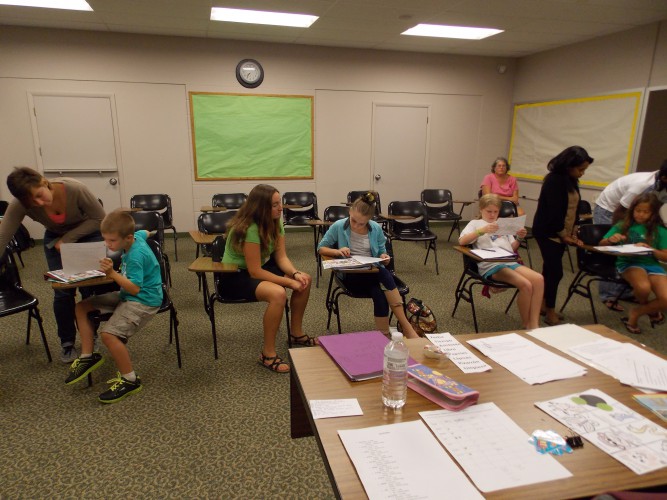 Charla Lorenzen, associate professor of Spanish and the chair of the Modern Languages Department at Elizabethtown College, has been working with Spanish education majors to bring foreign languages to local children living in Elizabethtown since 2010. “I started it around the same time that the Spanish education major was approved,” Lorenzen said. “You could say that the Spanish Education major and the Children’s Spanish Program are my babies, now that my own “baby” is 10!”
Charla Lorenzen, associate professor of Spanish and the chair of the Modern Languages Department at Elizabethtown College, has been working with Spanish education majors to bring foreign languages to local children living in Elizabethtown since 2010. “I started it around the same time that the Spanish education major was approved,” Lorenzen said. “You could say that the Spanish Education major and the Children’s Spanish Program are my babies, now that my own “baby” is 10!”
The program serves three purposes, according to Lorenzen. It provides Spanish classes for young children in an area that previously had no such programs, a place for education majors to hone their skills and a place for Lorenzen and her students to conduct research on effective language teaching techniques.
The program is not a required project for Spanish Education majors. Though they need to complete 25 hours of service in one semester, the Children’s Spanish program is only one option among many. Other projects include teaching English to local Spanish speakers, teaching Spanish to local English speakers and translating both for individuals and organizations such as the Elizabethtown College Admissions office.
Lorenzen and her student teachers use as much Spanish as possible during the classes. Handouts have English instructions and keywords for easier comprehension, while the spoken parts of the lessons are exclusively in Spanish. The class plays games to stay focused and motivated. They participate in a version of “Survivor” in which the students receive award points after each class in which they spoke only in Spanish. They can redeem these award points at the end of the semester for prizes. Students can earn more award points by working on their Spanish beyond class-assigned work: by watching a program in Spanish, bringing in words they want to learn or finding Spanish text in their daily lives.
You could say that the Spanish Education major and the Children’s Spanish Program are my babies…”
“Survivor” isn’t the only activity involved. Games, such as scavenger hunts, factor into the classes, as well. “We like to mix it up, to keep the kids interested,” Lorenzen said. The games often involve reviewing lessons such as vocabulary. They also include new grammar and phrases so students don’t forget what they’ve learned. The classes are full of these types of high-energy activities, which help keep the kids focused and the learning fast-paced.
The students pick up Spanish rapidly. “We teach it as a multi-level class specifically because the kids learn so quickly,” Lorenzen said. “When they see a classmate knowing how to do or say something Spanish, they just assume they can do it, too, and they learn very quickly.” New students receive a lot of support to help them catch up, and kids who have been part of the program for longer periods of time can take on extra learning options if they choose to.
Lorenzen said if any community members are interested, they can contact her to arrange a visit to observe the class. She also said that anyone who is interested in a sample of what they do in class can attend the Fall Fest as part of Into the Streets, Saturday, Oct. 26. The event involves a small Spanish class for beginners, and Lorenzen will likely implement a new class for beginners next fall. Registration for the Children’s Spanish Program takes place in the summer. College employees and any family that registers siblings get a 10–percent discount on each registration.

